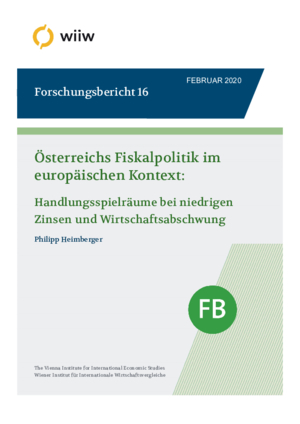Österreichs Fiskalpolitik im europäischen Kontext: Handlungsspielräume bei niedrigen Zinsen und Wirtschaftsabschwung
wiiw Research Report in German language No. 16, February 2020
28 pages including 2 Tables and 10 Figures
This publication is available in German language only.
For a brief English summary see further below.
Diese Studie analysiert die Spielräume und Handlungsoptionen der Fiskalpolitik in Österreich für die kommenden Jahre im europäischen Kontext. Unter der bestehenden Zins-Wachstumskonstellation bestehen in Österreich ebenso wie in mehreren anderen Eurozonenländern erhebliche Spielräume für eine expansivere Ausrichtung der Fiskalpolitik, ohne dass die Stabilität der öffentlichen Finanzen gefährdet wäre. Die bestehenden europäischen und nationalen Fiskalregeln erlauben dem österreichischen Gesamtstaat für das Jahr 2020 einen fiskalischen Stimulus von bis zu 3 Milliarden Euro (0,7% des BIP), wobei aktuell für das Jahr 2021 von einem mindestens ebenso hohen Spielraum auszugehen ist. Selbst bei einer vollständigen Ausschöpfung dieses Potenzials für eine expansivere fiskalpolitische Ausrichtung würde die Staatsschuldenquote weiter in Richtung des in den EU-Fiskalregeln festgelegten Grenzwerts von 60% des BIP absinken. Fiskalische Stabilisierungspolitik sollte im Wirtschaftsabschwung zeitgerecht umgesetzt, auf besonders betroffene Menschen zielgerichtet und temporär sein, um möglichst effektiv Beschäftigung und Wirtschaftswachstum zu fördern. Expansive fiskalpolitische Maßnahmen, die diesen Kriterien entsprechen, sind beispielsweise zusätzliche AMS-Mittel für Vermittlung und Qualifizierung, Kurzarbeitsbeihilfe, Sonderabschreibungen für Investitionen, und öffentliche Investitionen. Für öffentliche Investitionen lässt sich aktuell im Bereich der Klimapolitik jedoch unabhängig von der konjunkturellen Lage ein öffentlicher Investitionsbedarf feststellen. Insoweit ein langfristig angelegtes Investitionsprogramm nicht im Rahmen der kurzfristig vorhandenen fiskalischen Spielräume finanzierbar ist, könnten die Fiskalregeln adaptiert werden, um die Spielräume für investive Ausgaben des Staates (insbesondere in den Klimaschutz) zielgerecht auszuweiten. Dabei kommt etwa die Einführung einer goldenen Regel für öffentliche Investitionen in Frage, die öffentliche Nettoanlageinvestitionen aus den spielraumbeschränkenden Defizitmaßen herausrechnet.
English Summary
Austria's fiscal policy in a European context: Fiscal policy space in times of low interest rates and economic downturn
This study analyses the fiscal policy space in Austria for the coming years in a European context. Under the existing interest-growth constellation, there is considerable scope for a more expansionary fiscal policy stance in Austria as well as in several other euro area countries (including Germany and the Netherlands), and a well-dosed expansionary fiscal policy stance would not jeopardise the stability of public finances. The existing fiscal rules allow the Austrian state a fiscal stimulus of up to EUR 3 billion (0.7% of GDP) for the year 2020, with at least as much room for manoeuvre currently expected for 2021. Even if this potential for a more expansionary fiscal policy stance were to be fully exploited, the public debt-to-GDP-ratio would continue to fall towards the 60% of GDP limit set by the EU’s fiscal rules. Fiscal stabilisation policies should be timely, targeted at particularly affected people and temporary in order to promote employment and economic growth as effectively as possible. Expansionary fiscal policy measures that meet these criteria would include, for example, additional AMS funds for placement and qualification, short-time work subsidies, special depreciation possibilities for companies’ investment, and public investment. However, a need for additional public investment can currently be identified in the area of climate policy, irrespective of business cycle conditions. To the extent that a long-term investment programme cannot be financed within the existing fiscal framework, the fiscal rules could be adapted in order to expand the space for public investment (especially to tackle climate change). This could involve, for example, the introduction of a golden rule for public investment, which would remove public net fixed capital formation from the deficit indicators that restrict the room for manoeuvre.
Keywords: Fiskalpolitik, Österreich, Staatsschulden, Investitionen
JEL classification: E61, E62
Countries covered: Austria, Euro Area, Germany, Italy
Research Areas: Macroeconomic Analysis and Policy
